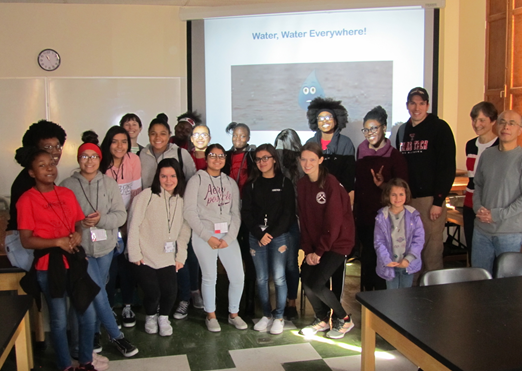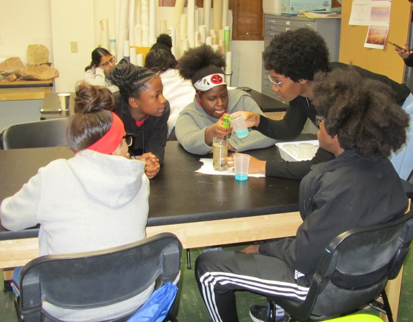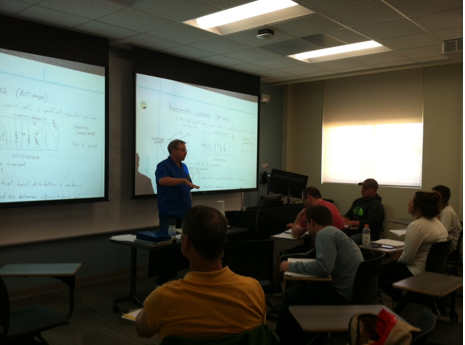Outreach
Geography & YouthMappers (GYM)
As the Geography program has expanded and become Geography and the Environment & Geographic Information Science, students opted to recreate the YouthMappers student organization. The President, Alex Varnas, provides more information on the group:
Tell me who you are and what your organization is.
My name is Alex Varnas, and I study philosophy and geography! Our organization, Geography & YouthMappers (or GYM), is a rendition to the original YouthMappers group but now with added components to make the group more open to all geoscience majors. We offer students a place to relate to each other through their shared interests, while also giving back to the community and places around the world through the work we do. Each year, we have an environmental focus topic to mold our years activities around.
What made you decide to move forward with the student organization?
For a while, I wondered why the geography department didn't have any kind of environmental student groups. I had a year ago, I made plans and tried my best to really start something, but I struggled to get all the working parts together on my own. it was the help of an advisor that sky-rocketed the group. Once we teamed up, everything moved much faster. Hannah's enthusiasm for the group is why GYM has made it this far!
What kinds of activities does your organization participate in?
Our organization has had a very full semester! Our events include mapathons, geography-trivia nights, camping trips, career-building workshops, volunteer opportunities, and other. Many of our members attended this semester's camping trip was a one-night stay in San Angelo Park after the SWAAG conference trip. It was a great time away from school to spend with each other!
What are some of your plans for the organization?
Our plans for spring are hopefully to get our GYM t-shirts out and host another fundraiser. We would also like to take another camping trip, maybe longer than a just night. We will also continue to host mapathons, trivia nights, and other regular events! For the future we just plan to keep the same spirit and energy alive, so GYM continues to grow.
How can alumni and friends of the program help the organization?
Alumni and friends can support GYM by participating in or sharing any fundraising content we share, spreading the name of Geography & YouthMappers around campus or elsewhere, or reaching out and interacting with our group!
Everyone is welcome to join Mapathons or follow our activities at https://www.facebook.com/youthmapperstexastech
To find out how you can support GYM, please feel free to reach out to GYM advisors Hannah Webb (hannah.m.webb@ttu.edu) or Dr. Abinash Bhattachan (abibhatt@ttu.edu)
What is YouthMappers?
Youthmappers was started at the TTU Geography Program under the guidance of Dr. Patricia Solis (now at Arizona State) and in conjunction with George Washington University and West Virginia University. The aim of the organization was to create citizen mappers around the world who could help map undermapped regions, especial for critical needs from disasters and for systemic and chronic problems like mosquito eradication or food deserts. Youthmappers receive significant funding from United States Agency for International Development and some corporate donors. More information is available at youthmappers.org. From the original three universities, there are now 269 universities around the world. Much of the work of the chapters is during “Mapathons”, a group real-time event for a specific need. Students gather to map and socialize. If you have never mapped, the Mapathon has links get you mapping in 15 minutes. With the onset of the COVID-19 pandemic that model was upended. Student interns Willem Lee-Stockton and Jesse Garcia developed a new remote Mapathon with livestreaming, interviews, and speakers. Members of the Department of Geosciences have participated, including Dr. Sandip Pal, Dr. Jeff Lee and Dr. Xiaopeng Song. This novel approach is being used now by many chapters and Willem and Jesse have spoken to several chapters and at conferences.
The TTU chapter mapped Puerto Rico after Hurricane Maria, landslides in Guatemala,
food networks in Angola, mosquito eradication in Malawi and is the first group to
have a location task in the US. Our chapter mapped Lubbock Districts One and Two in
conjunction with the Lubbock Compact.
Our students have earned various awards and internships through the program. TTU YouthMappers
have travelled to South Africa and Italy and set up new chapters in Belize, University
of North Texas, Texas Christian University and University of Indiana-South Bend (led
by the previous advisor, Cameron Griffith.)
Everyone is welcome to join Mapathons or follow our activities at https://www.facebook.com/youthmapperstexastech
You can email linda.jones@ttu.edu for more info
Texas Tech University's “The Ardon-Dryer Aerosol Group” Brings She Space International to Lubbock, A Multi-National Science Outreach Program for Female High School Students
By: Dr. Karin Ardon-Dryer
She Space International is a first-of-its-kind international educational program for the advancement of STEM among 14-16 year old high school girls. The She Space program started in 2018 at the Earth and Planetary Image Facility at the Ben-Gurion University of the Negev in Israel in memory of Debora Blumberg; at 2019 the program was expanded internationally to include research institutions from 4 countries, Israel (EPIF, BGU), Germany (DLR School Lab Oberpfaffenhofen), Brazil (Rural Federal University of Pernambuco), and the USA (Aerosol Group at Texas Tech University). During the project, teams of students from the 4 countries, guided by faculty and students from a research group at each institution, embark on joint study through which participating students are exposed to cutting-edge academic research and utilize imaging and communications collected or provided by the satellites and space agencies of their respective home countries.

In 2018, while visiting at the Ben-Gurion University, Dr. Ardon-Dryer met with Dr. Shimrit Maman who leads the She Space Program. Following her visit, Dr. Ardon-Dryer and her aerosol research group joined the program, adding Texas Tech University as the Institute representing the USA. The program officially started in April of 2019 with a round of interviews of high school students from around Lubbock, a diverse group of 9 students was selected to participate. During the months of May and June, the students attended weekly meetings; they were taught the necessary concepts and skills that they would require to complete their research projects. Throughout the program, the students also took part in intercontinental conference calls and gave progress updates. The last meeting was a conference call with all the program participants; each team presented a full report of its findings, in addition, all the participants received a special surprise video message from the United Nations Office for Outer Space Affairs Director, Simonetta Di Pippo.
This year program has ended, the students' feedback was positive, and all agreed that they would recommend this program to others. One student stated that participating in the program has opened her minds to new opportunities, that it was motivating and inspiring. Other students felt it gave them new appreciation, that they gained new interest in STEM. Looking forward, Dr. Ardon-Dryer is hoping to continue with the program, she is hoping to have some of the students return to help, but more than all she is excited to see where they will go from here.
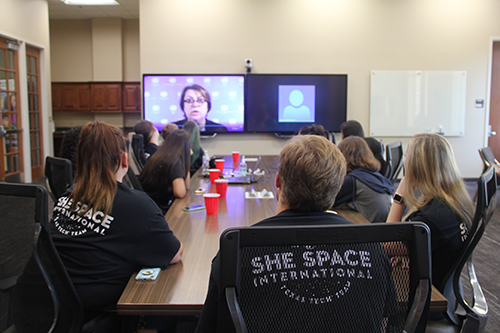
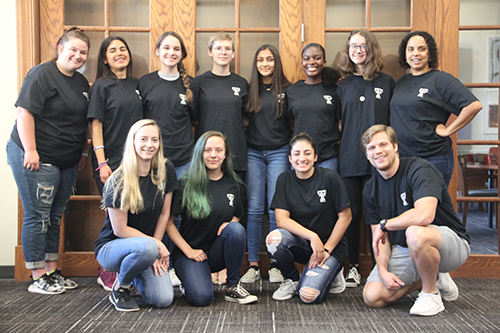
“Water, Water, Everywhere” STEM Outreach
‘Water, Water Everywhere' – STEM outreach activity to middle-school girls (see photo) and the new Environmental Geologyconcentration in the Geosciences BS degree.
While West Texas may be geologically best known for the productive oil and gas deposits of the Permian Basin, environmental geology is also an important component of our economy, lives and deeply intertwined with the petroleum industry. In oil-rich, dust-blowing West Texas, we have a shortage of water in terms of both precipitation and surface water. The treasured Ogallala aquifer continues to decline, resulting from decades of over-withdraw. Impacts of urban development and industrial activities on the environment have become palpable, including natural occurrences of toxic elements and contamination by manmade chemicals in soils and groundwater. Additionally, the petroleum industry uses significant amounts of water for exploration and development of reserves, collectively known as the Energy–Water Nexus.
In order to meet these competing needs it is necessary to educate and train a new generation of diverse geoscientists with broad skills in Geosciences. The Department of Geosciences is addressing this need through public outreach and enhancements to the undergraduate curriculum.
Recently, a group of Geosciences faculty (Dr. Moira Ridley, Dr Juske Horita, and Dr. Neo McAdams) and volunteer students (Alex Washburn, Raven Landers, Karen Yao, and Shanice Diniz) hosted a one-day Tech Savvy workshop titled ‘Water, Water Everywhere'. Tech Savvy is a STEM (Science, Technology, Engineering, and Mathematics) outreach program for middle-schools girls. The ‘Water, Water Everywhere' workshop focused on water and environment related issues in West Texas. Twenty-three middle-school girls from as far as away as Fort Stockton attended the workshop as well as an eager 8 year-old participant, Taylor, whose father was one of the graduate student presenters.
The workshop included an introduction to the water cycle and hands-on activities depicting groundwater and aquifers, mixed with lively discussions and interactions between faculty, student instructors and the girls. The workshop closed with an important discussion of water conservation. We plan to continue this new Tech Savvy workshop for middle-school girls, hoping that they may choose water and environment related subjects at high schools, and perhaps one-day a major in Geoscience here at TTU or another institution.
In 2017 the undergraduate BS in Geosciences was expanded to include a concentration in Environmental Geology. The department's desire to meet increasing demand for students pursuing careers in environment geology prompted the introduction of this new concentration. We added new senior-level course in Hydrogeology, which is currently taught by Dr. William Asquith (son to emeritus Dr. George Asquith) of USGS Texas Water Science Center in Lubbock, TX. Dr. William Asquith holds a Ph.D. in Geosciences as well as a Ph.D. in Civil Engineering and is an adjunct faculty member.
We are excited to announce that our first Environmental Geology BS student will graduate in May 2019 and roughly, 10% of the current undergraduate students have chosen this track. While a plurality of TTU Geosciences students continue to be interested in careers in the petroleum industry, we believe the new concentration is complimentary to providing the broad skills necessary in the field of Geosciences. A number of our graduates are successfully finding careers in industry and agencies related to environmental geosciences.
Hands-on activity with discussion of aquifers and groundwater.
Dr. William Asquith teaches a new Hydrogeology class
Department of Geosciences
-
Address
Department of Geosciences, 1200 Memorial Circle, Lubbock, TX 79409-1053 -
Phone
806.742.3102 -
Email
geosciences@ttu.edu

